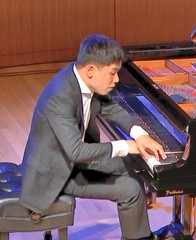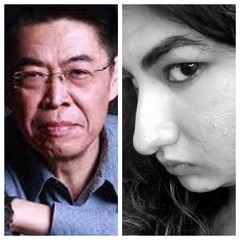|
Back
Painting the Musical Pictures New York
Zankel Concert Hall, Carnegie Hall
11/12/2021 -
Alessandro Marcello: Oboe Concerto in D minor (Arranged by Johann Sebastian Bach, BWV 974)
Robert Schumann: Humoresque in B-flat major, Opus 20
Zhang Zhao: Pi Huang
Nina Shekhar: Vocalise (World Premiere)
Franz Liszt: Reminiscences of “Norma”
Zhu Wang (Pianist)

Z. Wang (© Courtesy of the Artist)
“We often think of language as a tool to express our identity and emotions. Bit so much is also communicated nonverbally... When we take away language...how much meaning is lost, and how much is gained?”
Nina Shekhar, notes from Vocalise
“Der Dichter spricht” (The poet speaks)
Robert Schumann, from Scenes from Childhood
The vast majority of prize-winning celebrated young pianists these days attempt (and usually succeed) in playing faster than the speed of light. If sheer velocity, if utter astonishment is the utter aspiration, then these under-25 prodigies deserve all their prizes.
But, like a million-dollar gold diamond-encrusted picture frame, one must politely inquire, “Where’s the picture? Fingers are breathtaking, but where’s the breadth?”
Which brings us to Zhu Wang, 24 years old, winner of dozens of first places (including last night’s concert’s Young Concerts Artists (YCA). His fingers were in the right place, yes. But–rarity of rarities–he gave structure, he gave breadth, he offered us the visual sense of his music. And the standing ovation in Zankel Hall was only partly for his prodigious performance. It was essentially for the meaning behind the music.
No, this was not “intellectual depth” Brendel or Perehia style. That will come inevitably in time. But Mr. Wang did give us an emotional event for nearly all his diverse choices.
The exception was the unexceptional opening, Bach’s popular arrangement of the popular Marcello Oboe Concerto. Marcello never aimed to stagger his audience, but Zhu Wang played the first movement speedily indeed, his hands at times desynchronized. The Adagio was technically finer, but the oboe was a regal instrument, and Mr. Wang never reached the nobility. The final Presto was adequate, and Mr. Wang happily separated the left– and right-hand voices. But this was not entirely impressive.
After that, Mr. Wang became himself again, a seasoned performer since the age of 14, with a remarkable grasp of his work. In fact, few seasoned performers can grasp Schumann’s Humoreske. It is not a series of salonesque bagatelles. It is not a single unified work. Rather it a bi-polar–no, let’s make it a quinta–polar series of complex ideas.
Mr. Wang gave each work its own complete ideas. The opening was lyrical enough, but the dreamy central section was dreamily phrased. The second movement (with the famed invisible middle staff) was played with rapidly enough, yet with playful layers. That ersatz-pompous march had an an equal sense of play (Schumann always had the temperament of a kid), and the finale was both joyful and triumphant.
One felt that this was a thoughtful and vitally picturesque performance of a som complex work.

Z. Zhao/N. Shekhar (© Courtesy of the Artists)
Two premieres followed. The late Dr. Zhang Zhou must have been a pianist in the whizz-bang Horowitz style, since his Moments of Beijing Opera gave the pianist all kinds of technical hazards. Two thoughts came to mind. First, having lived in Hong Kong many years, I had to witness many a Chinese opera. My Mandarin being sparse, I found the operas ritualized burlesques. Mr. Zhou took liberties, but he made his “moments” into innovative tunes. The second thought was that, again pianist Wang was not only technically faultless but gave a visual impetus to the music.
Next was the YCA composer-in-residence Nina Shekhar’s Vocalise (commissioned by YCA and Mr. Wang). I think it must have been an enchanting set of improvisations on a recurring tune which resembled a shepherd melody of the Caucasus Mountain range. It was charming, tonal with some lovely echoing passages. The only problem for me was that Mr. Wang kept his right foot on the pedal almost constantly. The effect was partly east-Russian ethnic, partly like a Hungarian cembalon.
The end of the program (outside of an encore of Schubert’s A flat Impromptu) was a work which–in the hands of most young pianists–would be a chance for climactic fireworks. In Mr. Wang’s hands, Liszt’s Norma “reminiscence” became more than a blazing extravaganza. Mr. Wang made it actually sing. This was not a Liszt transcription: it was the memory of an opera, and the pianist last night gave, when he could between the endless cadenzas, bel canto arias, military marches and the great tragedy of Bellini’s making.
Mr. Wang, then, was no showoff with magical fingers. He understood and conquered difficulties, but he gave equal respect to the creation and imagination of his composers.
Harry Rolnick
|